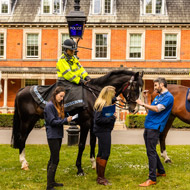Police horses line up for equine health survey

The police horses of Hyde Park lined up to get their hooves, eyes and teeth checked.
The Metropolitan Police Mounted Branch in Hyde Park has joined forces with Blue Cross to encourage horse owners to take park in a leading survey on equine health.
Taking place this week (22-29 May), The National Equine Health Survey seeks to uncover common health issues in horses, directly from the horse owners themselves. Results help to establish a picture of horse health in the UK and inform priorities for future research.
Kickstarting the event, the police horses of Hyde Park lined up to get their hooves, eyes and teeth checked, while Blue Cross staff clambered up ladders to check their vital statistics.
“These majestic police horses have taken part in our survey and we hope that they will encourage others to follow suit and be ambassadors for horse welfare,” commented Blue Cross education officer Gemma Taylor.
“The more data we can collect from the National Equine Health Survey the more robust our results will be, helping us to steer equine awareness, education and research to keep our nation’s horses healthier.”
For more than six years, the survey - in partnership with the BEVA - has grown to become the UK’s leading endemic disease monitoring initiative. The results are regarded as valuable for our general knowledge of horse health and are referenced in leading veterinary and equestrian publications.
Last year, the survey assessed some 17,000 horses, ponies, donkeys and mules. The six most notable disease syndromes identified were: lameness (32.9 per cent); skin diseases (25.5 per cent); laminitis (6.8 per cent); PPID (Equine Cushing’s Diseases) (6.6 per cent); Recurrent Airway Obstruction (5.6 per cent); and back problems (5.5 per cent).



 The latest
The latest